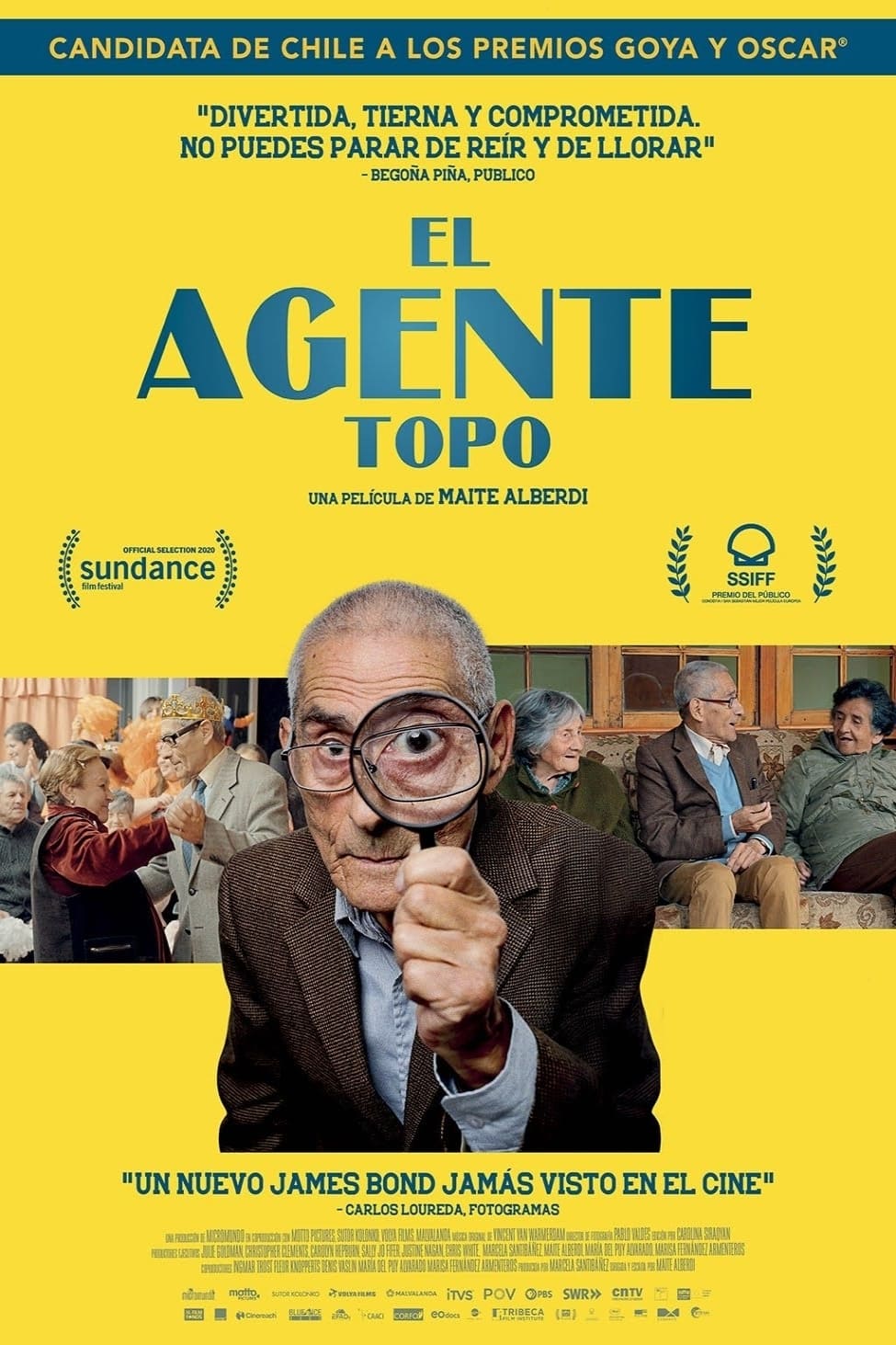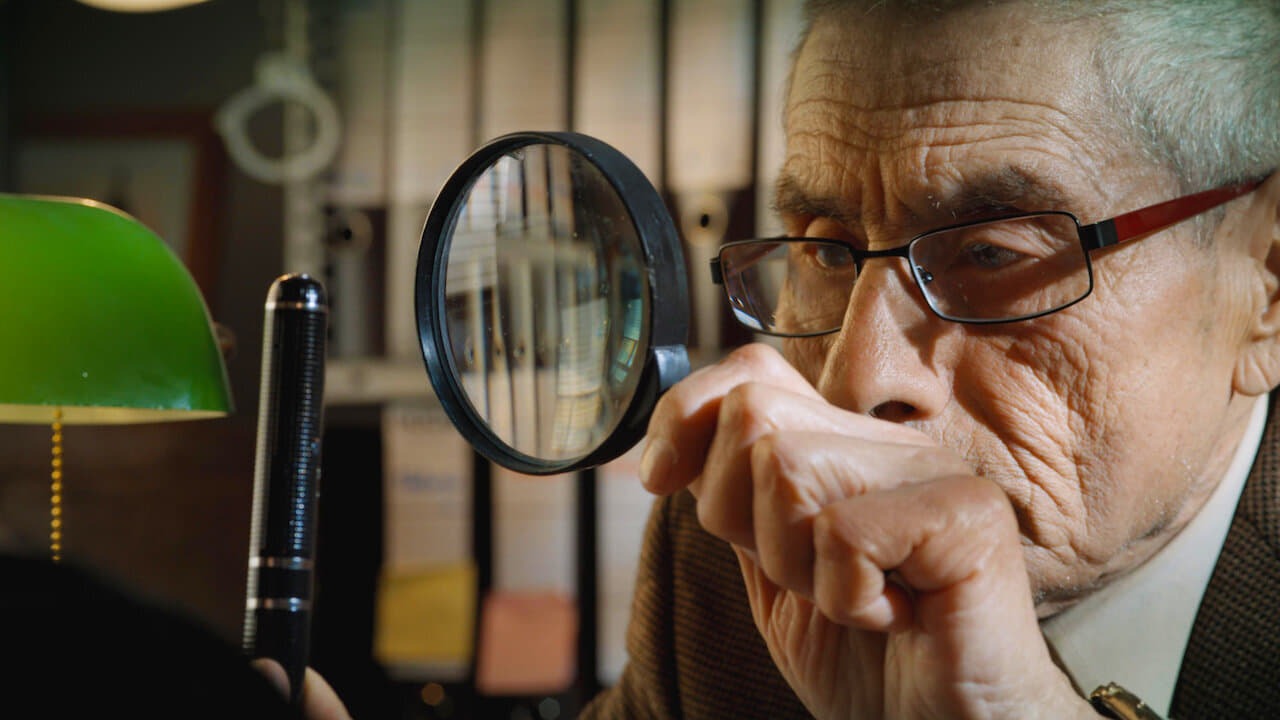
Old friends
There has been some muttering about whether or not it is strictly correct to call The Mole Agent a "documentary", and to this I have only one response: I don't really care what we call it, as long as we acknowledge that it's charming and good. But also, it's totally a documentary; it's just that we've generally forgotten in the English-speaking film world that documentaries can be artistically and narratively interesting (the film is Chilean). It is a documentary in the sense that it takes real people feeling real emotions and puts them in front of our eyes, even if it uses some very weird fictional techniques to generate those emotions. And these can be, in some respects, the very best documentaries.
Specifically, the film starts with the conceit that private detective Romulo Aitken has been hired to determine with an elderly patient at a nursing home is being mistreated. The best strategy he can come up with to run this investigation without tipping off the nursing home administration is to hire his very own senior citizen, Sergio Chamy, to infiltrate the nursing home as a new resident and surreptitiously inquire around to see if any of the existing residents know what's going on. I cannot say if director Maite Alberdi expected him to find anything, and if The Mole Agent was meant to be a scathing exposé of the dire state of Chile's elder care industry; my suspicion is that the she probably just wanted to see what happened. I am not familiar with any of Alberdi's earlier films, but her standard approach seems to be making these kind of weird conceptually odd documentaries about real people that filter them through fictional narration and genre, though The Mole Agent is her first one to actually set up unsuspecting subjects who don't realise they're part of a staged movie, Borat-style (though they do realise that they're being filmed, at least some of the time).
At any rate, the idea that Sergio is playing detective is one that the film fairly quickly loses interest in. Instead, most of the time is spent with him simply interacting with the nursing home residents, and this results in of the pleasantest movies I have ever seen about the inevitability of aging and the shameful ways in which we discard our elderly and write them off as "too old to be of use". Which is to say that there's an eventual ceiling on just how pleasant it can be, but it proved to be rather higher than I would have expected at the outset. The film gets a terrific amount of mileage out of Sergio simply having conversations, hearing interesting stories from people who are extremely reluctant to go along with the belief that their best days are behind them even as their bodies decline and their minds, in some cases, are starting to grow a little fuzzy. As he gets to know his new neighbors - most of them women, having outlived their husbands, which does mean that Sergio gets a bit of flirtatious attention that he doesn't seem to know what to do with - we get to know them as well, finding in them a population of people who remain sharp and self-aware, gregarious but a little bitter. This is the crucial ingredient: it's what keeps this from devolving into a simple exercise in declaring that the old people are so sweet, don't you adore how sweet they are, and nice, and cute - they are all of these things but also none of them. And the film's increasingly unsettled concern that there's something fundamentally sad - fundamentally dysfunctional, even - about the fact that they've been essentially rounded up into a holding pen where old people go to die, ends up cutting a little harder for coming through what seems, initially, like such a silly lark. This too, I gather, is something Alberdi is good at, sneaking in harsh observations when we're not quite ready for them. At any rate, she does it here to phenomenal effect.
So with all that in mind, and with the slightly cloudy joy of the film being the opportunity it gives us to meet these nice old folks, the question that starts to linger more and more awkwardly: what's up with the framework? Does The Mole Agent in fact need the mole agent. I mean. it definitely needs Sergio, who is incredibly likable in his own right, fumbling with great dignity as he deals with his spy technology, and providing a fine conversationalist for all the residents. And there's something understated and meaningful in the contrast between all of them, cast away to end their days as problems to be solved by the nursing home staff and viewed with at best condescending pity, and his ongoing life as someone with autonomy and a world waiting for him outside the nursing home walls. The film never forces us to notice this; it doesn't really have to. Sergio never entirely shakes that ironic knowledge out of his eyes.
But does he have to be a spy? Does he have to regularly check in with Aitken? I ask because I honestly don't know. Obviously, the genre hook gives The Mole Agent all of its commercial appeal, and is why it got nominated for an Oscar, which is why I watched it and therefore am now recommending it to all of you. But I do have to wonder if, with in the movie itself, it doesn't just get in the way. Certainly, the movie seems to have entirely forgotten about this gimmick, until suddenly for the span of this or that scene, it doesn't; and I can see why the film needs to have some sort of mechanism for hiding Sergio's identity. But the mechanism we get is awfully cumbersome at the start, setting us up for a narrative that simply never arrives, and it takes a lot of energy to get going for a film that, at a total of 84 minutes, doesn't really have the time to spare. I do not, I admit, have a specific better version of The Mole Agent in mind. But I am at least fairly confident that it exists.
Specifically, the film starts with the conceit that private detective Romulo Aitken has been hired to determine with an elderly patient at a nursing home is being mistreated. The best strategy he can come up with to run this investigation without tipping off the nursing home administration is to hire his very own senior citizen, Sergio Chamy, to infiltrate the nursing home as a new resident and surreptitiously inquire around to see if any of the existing residents know what's going on. I cannot say if director Maite Alberdi expected him to find anything, and if The Mole Agent was meant to be a scathing exposé of the dire state of Chile's elder care industry; my suspicion is that the she probably just wanted to see what happened. I am not familiar with any of Alberdi's earlier films, but her standard approach seems to be making these kind of weird conceptually odd documentaries about real people that filter them through fictional narration and genre, though The Mole Agent is her first one to actually set up unsuspecting subjects who don't realise they're part of a staged movie, Borat-style (though they do realise that they're being filmed, at least some of the time).
At any rate, the idea that Sergio is playing detective is one that the film fairly quickly loses interest in. Instead, most of the time is spent with him simply interacting with the nursing home residents, and this results in of the pleasantest movies I have ever seen about the inevitability of aging and the shameful ways in which we discard our elderly and write them off as "too old to be of use". Which is to say that there's an eventual ceiling on just how pleasant it can be, but it proved to be rather higher than I would have expected at the outset. The film gets a terrific amount of mileage out of Sergio simply having conversations, hearing interesting stories from people who are extremely reluctant to go along with the belief that their best days are behind them even as their bodies decline and their minds, in some cases, are starting to grow a little fuzzy. As he gets to know his new neighbors - most of them women, having outlived their husbands, which does mean that Sergio gets a bit of flirtatious attention that he doesn't seem to know what to do with - we get to know them as well, finding in them a population of people who remain sharp and self-aware, gregarious but a little bitter. This is the crucial ingredient: it's what keeps this from devolving into a simple exercise in declaring that the old people are so sweet, don't you adore how sweet they are, and nice, and cute - they are all of these things but also none of them. And the film's increasingly unsettled concern that there's something fundamentally sad - fundamentally dysfunctional, even - about the fact that they've been essentially rounded up into a holding pen where old people go to die, ends up cutting a little harder for coming through what seems, initially, like such a silly lark. This too, I gather, is something Alberdi is good at, sneaking in harsh observations when we're not quite ready for them. At any rate, she does it here to phenomenal effect.
So with all that in mind, and with the slightly cloudy joy of the film being the opportunity it gives us to meet these nice old folks, the question that starts to linger more and more awkwardly: what's up with the framework? Does The Mole Agent in fact need the mole agent. I mean. it definitely needs Sergio, who is incredibly likable in his own right, fumbling with great dignity as he deals with his spy technology, and providing a fine conversationalist for all the residents. And there's something understated and meaningful in the contrast between all of them, cast away to end their days as problems to be solved by the nursing home staff and viewed with at best condescending pity, and his ongoing life as someone with autonomy and a world waiting for him outside the nursing home walls. The film never forces us to notice this; it doesn't really have to. Sergio never entirely shakes that ironic knowledge out of his eyes.
But does he have to be a spy? Does he have to regularly check in with Aitken? I ask because I honestly don't know. Obviously, the genre hook gives The Mole Agent all of its commercial appeal, and is why it got nominated for an Oscar, which is why I watched it and therefore am now recommending it to all of you. But I do have to wonder if, with in the movie itself, it doesn't just get in the way. Certainly, the movie seems to have entirely forgotten about this gimmick, until suddenly for the span of this or that scene, it doesn't; and I can see why the film needs to have some sort of mechanism for hiding Sergio's identity. But the mechanism we get is awfully cumbersome at the start, setting us up for a narrative that simply never arrives, and it takes a lot of energy to get going for a film that, at a total of 84 minutes, doesn't really have the time to spare. I do not, I admit, have a specific better version of The Mole Agent in mind. But I am at least fairly confident that it exists.






